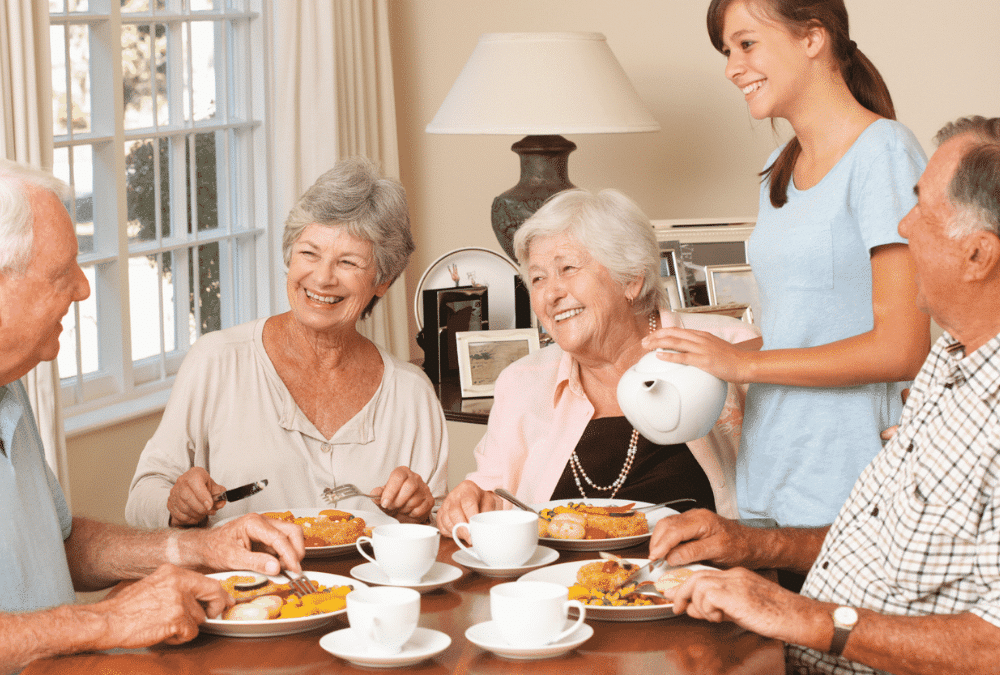Getting the right vitamins and minerals into the body is essential at all ages for health and wellbeing. It’s important to be eating the right food at an older age in order to prevent bone and muscle deterioration, as well as disease and illness.
What makes nutrition more difficult for older people?
Malnutrition is prevalent in older adults. There are a number of factors that can contribute to poor nutrition as somebody becomes older.
Access to fresh and healthy foods
It can become harder to leave the house as someone becomes older which makes fresh food a more difficult thing to acquire. As someone becomes older it can also be riskier to drive making a bigger food shop more inaccessible. A good answer to this is home deliveries and fruit and veg boxes delivered to the door. This can be a difficult new way of life for your older loved one to acclimate to and this may need to be set up for them if your loved one isn’t completely comfortable with technology.

Motivation
If someone is living alone it can be difficult to want to cook healthy satiating meals regularly if it’s only for themselves. This can lead to a higher intake of quick and easy, but less nutrient-dense foods such as toast and cereal.
In general, as someone becomes older physical activity decreases resulting in less food is needed, which again will reduce the motivation to make healthy meals, and opting for a quick snack can be easier. It is important to know that not all snacks are equal and there are still ways to encourage a loved one to incorporate vital nutrients into their diet through nutrient-dense snacks when they may not have someone to cook for them, or want to/be able to cook for themselves.
It can also become difficult for older people to gain the same excitement from food that they once had due to the potential deterioration in taste and smell that they may be experiencing. Mental illness like depression and factors related to loneliness can also reduce appetite and motivation to fuel the body as it needs.
Dental issues
Dental issues are more likely to come up as someone grows older such as receding gums, mouth sores, missing teeth and jaw pain. These can make eating more painful and can therefore cause older people to be more likely to skip meals.

What benefits does good nutrition provide the elderly?
Getting the right nutrition can improve mood and health, especially in older people who become more susceptible to illness and lethargy.
Preventing illness
There are many different foods known for boosting the immune system. Many are very easy to add to the diet such as garlic and turmeric, along with many fruits and veggies. Immune-boosting food will make your loved one less likely to fall ill, or decrease severity of illness due to the healthy immune system. A balanced and healthy diet also lowers risk of developing chronic health conditions, such as heart disease and diabetes.
Mental health
It is well known that a good diet can benefit a person’s mood. Not only indirectly through reduced illness, but also by directly increasing energy, improving wellbeing, and mood. Being able to enjoy meals with others is also a great way to boost the mood.
Ways to improve the nutritional intake of the elderly
If you are in a position where you can make regular meals for your loved one or influence their food intake, then there are a number of steps you can take to increase their nutrition.
Small meals and snacks
Three large meals a day can be overwhelming for older adults, so smaller meals and nutritious snacks like berries and yogurt or mixed nuts can be better and seem more achievable, even if at the end of the day it is the same amount of food.
Increase variety of foods
Make sure your loved one is eating enough food from each food group. An easy meal like noodles which doesn’t benefit the body much by itself can be boosted with the addition of eggs, vegetables, protein sources and cooked in a homemade stock for extra vegetable vitamins. Adding as many different colours and flavours to a meal will not only increase it’s nutritional profile but will also make for a more enjoyable eating experience.

Make mealtimes social
If you have time to sit down for regular meals with your loved one then this is incredibly beneficial as there is evidence that shows social isolation can link to malnutrition in the elderly from fewer fruits and vegetables consumed and less general variety. Even if you can’t be there in person, eating together over Zoom or other video platforms can still reduce feelings of isolation and in turn improve diet. At Little Croft Care Home, we offer completely social meals times where our residents can get together and socialise while enjoying high-quality freshly cooked meals. We believe this is integral to the ongoing wellbeing and health of our residents.
Increase calories without increasing volume
If cooking for an elderly loved one there are steps you can take to increase the calories, and therefore energy the meal provides, without increasing the volume. For example, the addition of sauces, gravy, and grated cheeses can boost calories (and all these items can also add to the variety, enjoyment, and extra vitamins in the meal). The addition of honey, treacle, or maple syrup to cereal or oatmeal can also make for a more calorie-dense breakfast.
Take advantage of local services
You may be in an area that has easy access to reliable food delivery services making fresh food easier to obtain. There are also increasing options for food boxes that provide all the fresh ingredients and recipes for easy and healthy dinners.

How does Little Croft Care Home prioritise nutrition?
At Little Croft Care Home, we put a lot of time and effort into deciding on meal plans with our residents’ preferences in mind, and putting together delicious and healthy meals. Our chefs use quality local ingredients at peak freshness for varied and nutritious dishes.
We aim to make the whole eating experience positive for all our residents with welcoming and newly refurbished dining rooms. We do encourage socialisation during mealtimes; however, we do leave this down to the preference of our residents and they can eat in their personal room if they would rather.
Our afternoon teas are also a hit with our residents with a range of cakes and sandwiches to suit all tastes.
At Little Croft Care Home we hold a 5-star rating from the Local Authority for Food and Hygiene which is a testament to the dedication of our team of chefs in providing the best quality meals for our residents.
We understand that nutrition can be difficult to do correctly. If ensuring that your loved one is getting the right nutrients and eating enough is becoming hard then contact us at Little Croft and we can help. We offer respite care options if neither of you are sure if transitioning to full-time care is the right choice.

